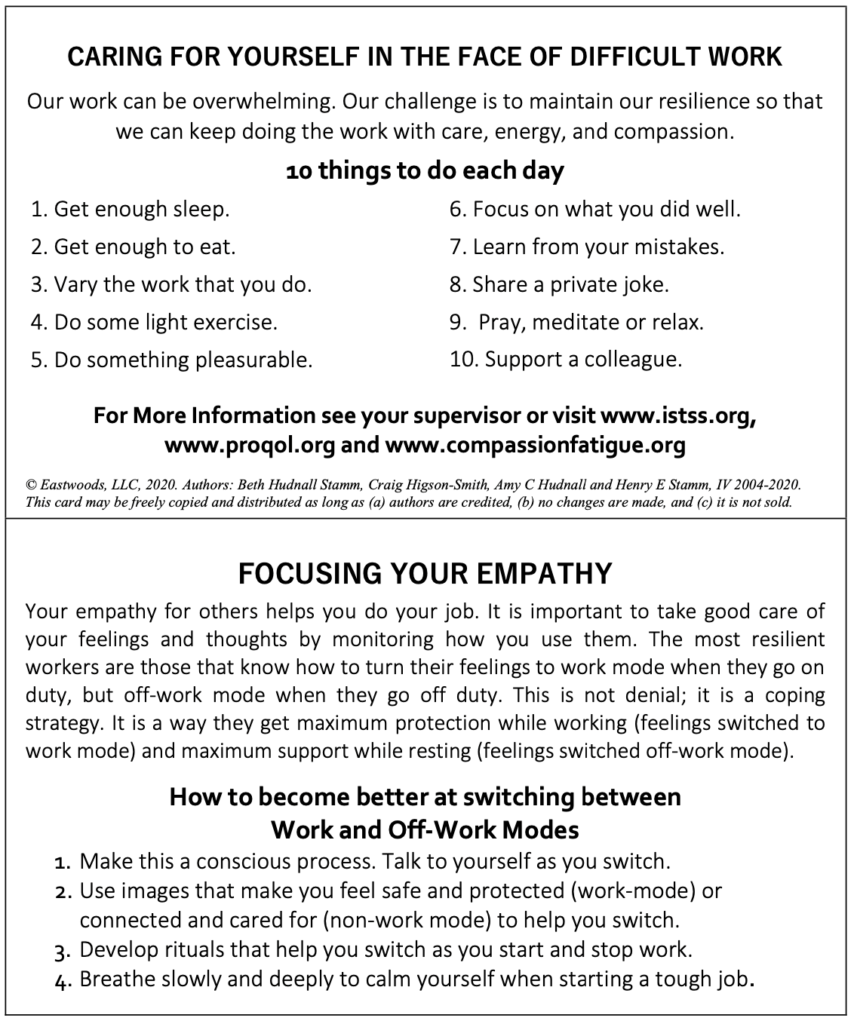
Compassion Satisfaction is the antidote to Compassion Fatigue. It encompasses the pleasure and satisfying feeling that comes from helping others. Many people enter helping professions because they have empathetic attitudes for others’ difficulties and a strong desire to assist in alleviating the difficulties. They are providing healing, encouragement, and support to others who are facing difficulties. Examples of these professions include: doctors, nurses, health care workers, pharmacists, teachers, paramedics, police, operators, therapists and many more professions that have continued to attend to their jobs day to day during the COVID-19 pandemic.
Compassion satisfaction is coming home from work feeling good about the work we did and spreading the positivity and encouragement of ongoing work life.
Flipping the switch to Compassion Satisfaction involves employing self-care strategies that manage stress and defend against Compassion Fatigue, allowing us to focus attention instead on our own quality of life and the aspects of our work that are rewarding. Here are some practices that have proven to increase Compassion Satisfaction:
- Proactively taking stock of and prioritizing the challenges you face.
- Sharing challenges and potential solutions with others.
- Carving out time for ourselves.
- Practicing delegating.
- Establishing a transition time and activity between work and home.
- Learning to say no (or yes) more often.
- Assessing and managing your trauma inputs (consider reducing extra trauma input, e.g., interactions with negative co-workers, distressing or divisive news, disturbing television programs, etc.)
- Joining a peer support group.
- Attending professional training regularly.
- Exercising regularly.
- Actively practicing and internalizing gratitude.
Beth Hudnall Stamm, Craig Higson-Smith, Amy C. Hudnall and Henry E. Stamm compiled the following set of self-care strategies that help maximize compassion satisfaction. The text was originally published as a handy pocket card to remind yourself to practice the strategies regularly:
 CARING FOR YOURSELF IN THE FACE OF DIFFICULT WORK
CARING FOR YOURSELF IN THE FACE OF DIFFICULT WORK
Our work can be overwhelming. Our challenge is to maintain our resilience so that we can keep doing the work with care, energy, and compassion.
10 things to do each day:
- Get enough sleep.
- Get enough to eat.
- Vary the work that you do.
- Do some light exercise.
- Do something pleasurable.
- Focus on what you did well.
- Learn from your mistakes.
- Share a private joke.
- Pray, meditate or relax.
- Support a colleague.
For more information visit www.istss.org, www.proqol.org and www.compassionfatigue.org.
FOCUSING YOUR EMPATHY
Your empathy for others helps you do your job. It is important to take good care of your feelings and thoughts by monitoring how you use them. The most resilient workers are those that know how to turn their feelings to work mode when they go on duty, but off-work mode when they go off duty. This is not denial; it is a coping strategy. It is a way they get maximum protection while working (feelings switched to work mode) and maximum support while resting (feelings switched off-work mode).
How to Become Better at Switching Between Work and Off-Work Modes
- Make this a conscious process. Talk to yourself as you switch.
- Use images that make you feel safe and protected (work-mode) or connected and cared for (non-work mode) to help you switch.
- Develop rituals that help you switch as you start and stop work.
- Breathe slowly and deeply to calm yourself when starting a tough job.
© Eastwoods, LLC, 2020. Authors: Beth Hudnall Stamm, Craig Higson-Smith, Amy C Hudnall and Henry E Stamm, JV 2004-2020. The card may be freely copied and distributed as long as (a) authors are credited, (b) no changes are made, and (c) it is not sold. Download a PDF of the card here: https://proqol.org/helper-pocket-card

 .
.